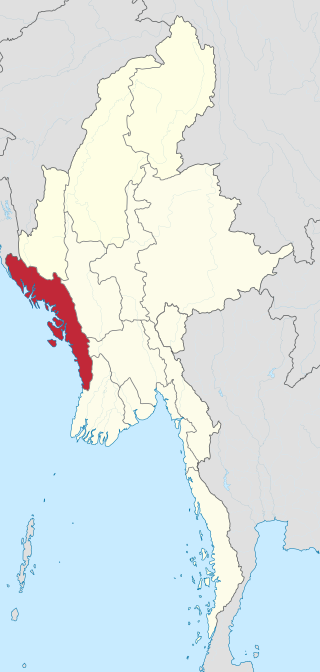
Rakhine State, formerly known as Arakan State, is a state in Myanmar (Burma). Situated on the western coast, it is bordered by Chin State to the north, Magway Region, Bago Region and Ayeyarwady Region to the east, the Bay of Bengal to the west and the Chittagong Division of Bangladesh to the northwest. It is located approximately between latitudes 17°30' north and 21°30' north and longitudes 92°10' east and 94°50' east. The Arakan Mountains or Rakhine Yoma separated Rakhine State from central Burma from North to South. Off the coast of Rakhine State there are some fairly large islands such as Ramree, Cheduba and Myingun. Rakhine State has an area of 36,762 square kilometres (14,194 sq mi) and its capital is Sittwe.

The Rohingya people are a stateless Indo-Aryan ethnic group who predominantly follow Islam and reside in Rakhine State, Myanmar. Before the Rohingya genocide in 2017, when over 740,000 fled to Bangladesh, an estimated 1.4 million Rohingya lived in Myanmar. Described by journalists and news outlets as one of the most persecuted minorities in the world, the Rohingya are denied citizenship under the 1982 Myanmar nationality law. There are also restrictions on their freedom of movement, access to state education and civil service jobs. The legal conditions faced by the Rohingya in Myanmar have been compared to apartheid by some academics, analysts and political figures, including Nobel laureate Bishop Desmond Tutu, a South African anti-apartheid activist. The most recent mass displacement of Rohingya in 2017 led the International Criminal Court to investigate crimes against humanity, and the International Court of Justice to investigate genocide.
The 2012 Rakhine State riots were a series of conflicts primarily between ethnic Rakhine Buddhists and Rohingya Muslims in northern Rakhine State, Myanmar, though by October Muslims of all ethnicities had begun to be targeted. The riots started came after weeks of sectarian disputes including a gang rape and murder of a Rakhine woman which police allege was committed by three Rohingya Muslims. On 8 June 2012, Rohingyas started to protest from Friday's prayers in Maungdaw township. More than a dozen residents were killed after police started firing. A state of emergency was declared in Rakhine, allowing the military to participate in administration of the region. As of 22 August 2012, officially there were 88 casualties: 57 Muslims and 31 Buddhists. An estimated 90,000 people were displaced by the violence. Around 2,528 houses were burned; of those, 1,336 belonged to Rohingyas and 1,192 belonged to Rakhines.

The Rohingya conflict is an ongoing conflict in the northern part of Myanmar's Rakhine State, characterised by sectarian violence between the Rohingya Muslim and Rakhine Buddhist communities, a military crackdown on Rohingya civilians by Myanmar's security forces, and militant attacks by Rohingya insurgents in Buthidaung, Maungdaw, and Rathedaung Townships, which border Bangladesh.
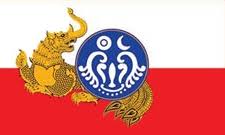
The Arakan National Party, is a political party in Myanmar (Burma), representing the interests of the Rakhine people in Rakhine State and Yangon Region. The party was founded on 13 January 2014 and registered with the Union Election Commission on 6 March 2014. The chairman of the ANP is Thar Htun Hla. The party is known for its hardline ethnic nationalist stance, as well as its Islamophobic and anti-Rohingya positions. Some members of the party were involved in instigating violence against Rohingya people during the communal riots in 2012, which left dozens dead and thousands homeless.
Nurul Islam is a Rohingya political activist and Yangon-educated lawyer from Myanmar (Burma). He is the president of the Arakan Rohingya National Organisation (ARNO) and lives with his family in London, the United Kingdom.
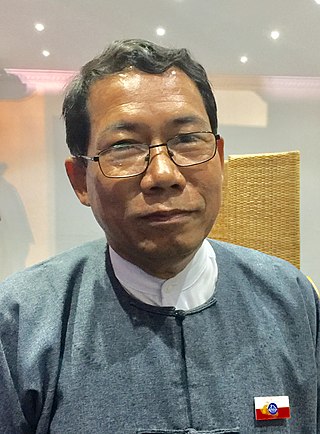
Aye Maung is a Burmese politician and was the chairperson of the Arakan National Party, one of Myanmar's ethnic political parties. He is currently the leader of the Arakan Front Party. He is a staunch nationalist known for his hardline stance against the Rohingya people, having tirelessly campaigned against the minority group and have been involved in instigating attacks against them in the communal violence in 2012.

The Rohingya genocide is a series of ongoing persecutions and killings of the Muslim Rohingya people by the military of Myanmar. The genocide has consisted of two phases to date: the first was a military crackdown that occurred from October 2016 to January 2017, and the second has been occurring since August 2017. The crisis forced over a million Rohingya to flee to other countries. Most fled to Bangladesh, resulting in the creation of the world's largest refugee camp, while others escaped to India, Thailand, Malaysia, and other parts of South and Southeast Asia, where they continue to face persecution. Many other countries consider these events ethnic cleansing.
Violent clashes have been ongoing in the northern part of Myanmar's Rakhine State since October 2016. Insurgent attacks by the Arakan Rohingya Salvation Army (ARSA) have led to sectarian violence perpetrated by Myanmar's military and the local Buddhist population against predominantly Muslim Rohingya civilians. The conflict has sparked international outcry and was described as an ethnic cleansing by the United Nations High Commissioner for Human Rights. In August 2017, the situation worsened and hundreds of thousands of refugees fled Myanmar into Bangladesh, with an estimated 500,000 refugees having arrived by 27 September 2017. In January 2019, Arakan Army insurgents raided border police posts in Buthidaung Township, joining the conflict and beginning their military campaign in northern Rakhine State against the Burmese military.
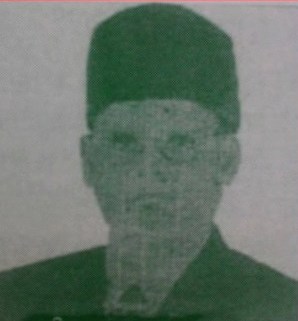
Mohammed Abdul Gaffar (1910–1966), also known as Abdul Gaffar, was a politician from Arakan, Burma. He was elected to the Legislature of Burma in British Burma from Buthidaung in 1947. After Burmese independence in 1948, the President of Burma Sao Shwe Thaik appointed Gaffar as one of the seven members of the Inquiry Commission of Arakan in 1949. Gaffar was elected to the Chamber of Nationalities from Akyab West constituency in 1952. He was elected from Maungdaw in 1956. He also served as Parliamentary Secretary for the Ministry of Health in the government of Prime Minister U Nu.

Sultan Mahmud was a politician from Arakan, Burma. In the British Raj, Mahmud served as cabinet secretary in the Central Legislative Assembly. After Burmese independence, he was elected to the Parliament of Burma through a by election from Buthidaung in 1957. He was re-elected in 1960. He served as Minister of Health of the Union of Burma from 1960 till the 1962 Burmese coup d'état.

Sultan Ahmed was one of the longest serving legislators from Arakan, Burma. Ahmed was the president of the Jamiat-e-Ulema party, which was allied with the Anti-Fascist People's Freedom League, the founding political party of Burma. Ahmed served in the Burmese parliament until the 1962 Burmese coup d'état.

Fazal Ahmed is a Rohingya lawyer and former politician in Myanmar. He was a leader of the National Democratic Party for Human Rights (NDPHR). He was elected as Parliament of Myanmar MP during the 1990 Burmese general election.
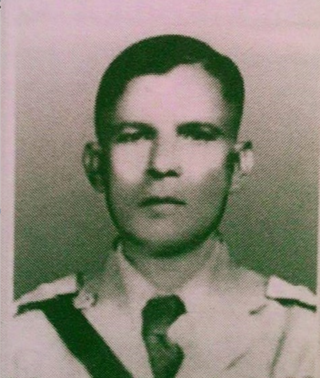
Abul Khair was a Rohingya police officer in British Burma who was later elected to the parliament of the Union of Burma.

The Bangladesh–Myanmar border is the international border between the countries of Bangladesh and Myanmar. The border stretches 271.0 kilometres, from the tripoint with India in the north, to the Bay of Bengal in the south. About 210 km (130 mi) of the border is fenced, with the government of Myanmar announcing in 2017 that it was planning to fence off the rest of the border.

The Mayu Frontier District was a short-lived administrative zone of Burma which existed between 1961 and 1964. It covered the Maungdaw District of present-day Rakhine State in the historical region of Arakan. The zone was administered directly from the capital Rangoon.

Inn Din is a village in northern Rakhine State, Myanmar. The village is in an area of mixed ethnicity, including Rohingya and ethnic Rakhine people. In December 2017, a mass grave with ten Rohingya men was discovered near the Inn Din cemetery. In January 2018, the Myanmar military admitted that its soldiers and Rakhine paramilitaries had killed the ten Rohingyas in September of the previous year.

The Arakan Front Party is a political party in Myanmar seeking Arakanese self-determination and holding hardline ultranationalist, anti-Rohingya and anti-Islam stances. It was founded on 11 October 2018 by Dr. Aye Maung, former chairman of the Arakan National Party, and his colleagues, including his son Tin Maung Win.

Kyaw Zaw Oo is an Arakanese politician, who used to serve as a member of parliament in the Rakhine State Hluttaw for (2015–2020) tenure. He was elected MP as an independent candidate in Sittwe-2 constituency in 2015. He is now leading the Arakan Front Party as its vice chair.
Events in the year 2022 in Myanmar.















